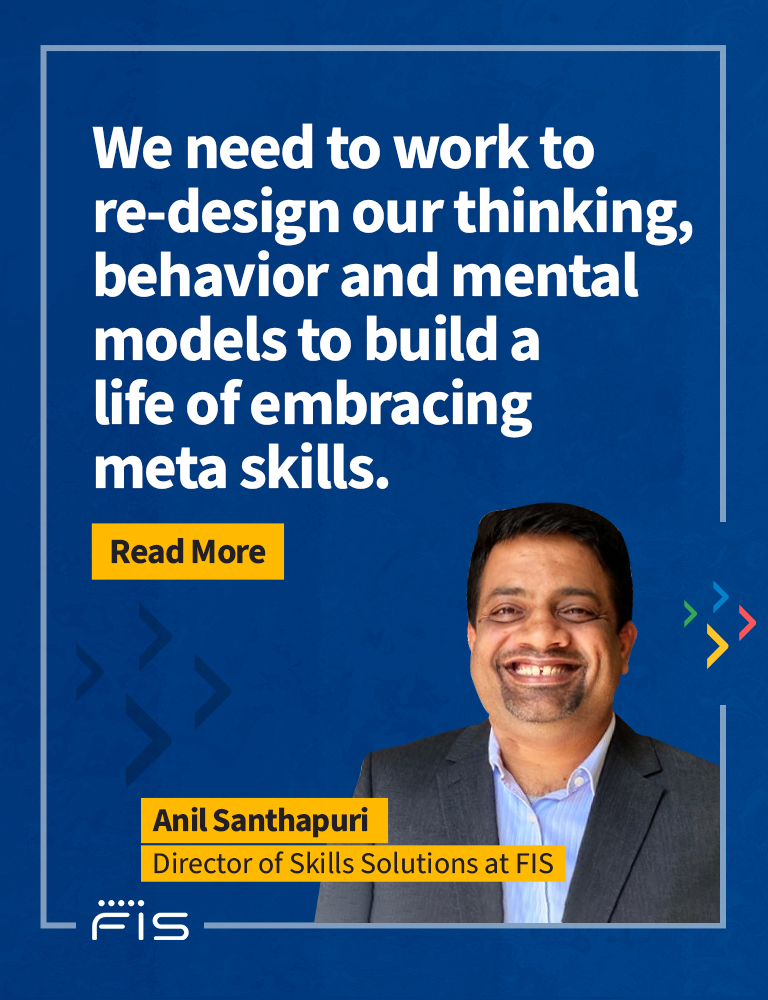Finding the Balance between Upskilling, Reskilling and Meta-Skilling
Today we live in a world where man-machine interactions are implicit and pervasive in most walks of life. With emerging technologies becoming mainstream and increasing computing abilities– the manual side of jobs is getting automated at an unprecedented rate.
In his book, Thank you for Being Late, Thomas Friedman talks about the rate of change of technology outpacing the rate at which human adaptability skills are increasing – we are at a critical threshold where we need to learn faster and govern smarter. The reality is that we’ve been, well, outpaced.

To understand how the future is unraveling, let me present some key imperatives basis the World Economic Forum’s Future of Jobs Report 2020
- Digital Transformation on the rise in all industries (different pace and adoption in different industries)
- Automation even more important from cost and resource optimization
- Skill gaps are huge and the window of opportunity to (re)train the workforce is very close
- Unprecedented scale and need to up/re-skill current and future workforce
Are our organizations, academic institutions geared up for this and Are you ready to navigate these changes for your own career?
Top Skills of the Future
It is obvious that some key technologies will take center stage and disrupt most industries and business models. So irrespective of which industry you are in, you will be impacted by the below listed technologies. Depending on the nature of your role, you need to re-align your role and integrate these technologies into your day-to-day tasks, or for some of us, we need to master these technologies and their implementation too.
- Cloud computing
- Big data analytics (BDA)
- Internet of Things and connected devices
- Encryption and Cybersecurity
- Artificial Intelligence (including ML)
The World Economic Forum report also lists the “Top 15 Skills of the Future 2025”:
- Analytical thinking and innovation
- Active learning and learning strategies
- Complex problem solving
- Critical thinking and analysis
- Creativity, originality and innovation
- Leadership and social influence
- Technology use, monitor and control
- Technology design and programming
- Resilience, stress tolerance and flexibility
- Reasoning, problem-solving and ideation
- Emotional intelligence
- Trouble shooting and user experience
- Service orientation
- Systems analysis and evaluation
- Persuasion and negotiation
Do you see any patterns do you see here?
The Skills of the Future are “Higher Order Skills”
As you reflect on the Top 15 skills listed above, we can consider re-ordering them in the below clusters:
- Technology Adoption & Use: Technology design and programming, use and adoption, Systems analysis and evaluation
- Customer Centricity & Experience: Trouble shooting, user experience and service orientation
- Growth Mindset & Active Learning: Active learning and learning strategies
- Critical Thinking & Complex Problem Solving: Analytical thinking and innovation; Complex problem solving; Critical thinking and analysis; Creativity, Originality & Initiative; Reasoning, problem-solving & Ideation
- Leadership & Emotional Intelligence: Emotional intelligence, Resilience, stress-tolerance, flexibility, social influence, persuasion and negotiation
Except for “Technology adoption and use” all other clusters can be classified into “higher order skills” and “meta skills”. These higher order skills need to be dealt with and learned differently than regular skills.
The Advent of Meta Skills
In “The Skilling Challenge” published by McKinsey and Ashoka, Meta Skilling is defined to “Enable individuals to embrace the new mindset embracing life-long learning and other overarching life skills”.
Expanding on this definition of Meta Skilling , I would add that as the rate of change of technology is so rapid, having mere ability to skill, upskill and reskill might not be enough to future-proof ourselves. We need to be adept at certain meta skills (which provide mindset of lifelong learning of learn, unlearn and relearn) as these meta skills when evolved can accelerate our time to competence of changing upskilling and reskilling needs. Therefore, we need to work to re-design our thinking, behavior and mental models to build a life of embracing meta skills.
Striking the Right Balance: Up-Skilling, Re-Skilling and Meta Skilling
The trick is to ensure we find the right balance between our focus, attention and commitment in:
- Up-Skilling in roles which are getting impacted by new technologies, etc. – this makes you performance compliant in your current role in the short term
- Re-Skilling in new emerging technologies and higher order skills – this future-proofs your career for the changes industry is undergoing over the next 2-3 years
- Meta Skilling in embracing lifelong skills that provide an edge to navigate in a D-VUCAD (disruption, volatility, uncertainty, complexity, ambiguity and diversity) world – this will setup a lifelong trajectory of future-proofing your career in the long run

A tactical suggestion would be to have ongoing development goals for yourselves aligned to these three categories of skills. This will ensure we pay equal attention and strike the right balance.
Written by Anil Santhapuri, Director of Skills Solutions, FIS.


